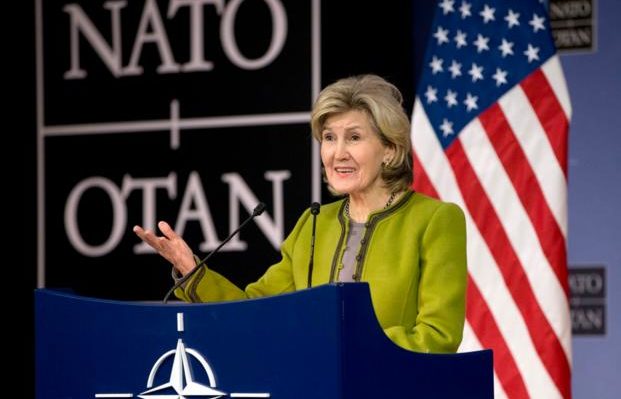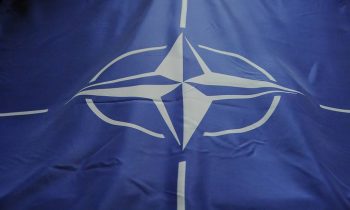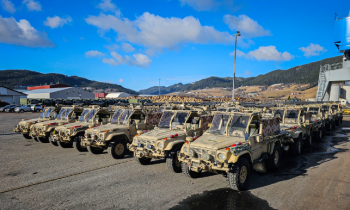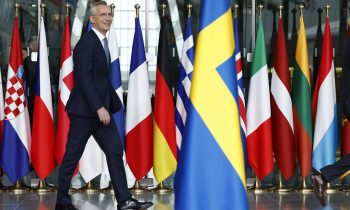A proposal from German defence minister Annegret Kramp-Karrenbauer for an international coalition to stabilise Northern Syria was welcomed by the US and other NATO allies on Wednesday.
NATO member Turkey’s military operation in northern Syria is to dominate a meeting of North Atlantic Treaty Organisation defence ministers in Brussels on Thursday and Friday.
The issue has become even more controversial after Turkey on Tuesday sealed a deal with Moscow for Russian forces to help clear Kurdish fighters from the “safe zone” it is creating in northern Syria and to patrol the area.
US NATO ambassador Kay Bailey Hutchison said the plan was “positive” but also voiced uncertainty over how Russia’s new involvement in the conflict would affect proposals.
Hutchinson added that she did not think US involvement was “in the works right now at all”, stating that she did not see what role Washington had to play after its European allies had stepped forward.

Below is a full rush transcript of the press conference with With Ambassador Kay Hutchison, U.S. Permanent Representative to the North Atlantic Treaty Organization.
Ambassador Hutchison: It’s wonderful to be here today and getting ready to welcome our Secretary of Defense Mark Esper. And I think there will be a good exchange of information and views in the next two days in Brussels.
Let me give you the top lines of what we’re going to be talking about at the defense ministerial, where all of our 28 allies will be sending their defense ministers to discuss the issues of today, and our NATO – our leaders meeting preparation and what we have been doing since the Brussels Summit last year. Certainly, burden-sharing and defense investment will be a key topic. In the last two years we are seeing huge improvements in defense budgets and it’s beginning to look like we will have at least probably 100 billion in added defense spending by our non-U.S. allies, which is for the strength of our overall burden-sharing, it’s for the strength of the alliance, it’s providing the airplanes and the tanks and the ships and the troops that we need to have an effective deterrence and defense. And I think we will have a good report on that.
We also are going to be reporting on the NATO Readiness Initiative – that is the ‘Four Thirties,’ where we are trying to achieve from our 28 allies and ourselves 30 mechanized battalions, 30 air squadrons, 30 combat vessels, ready to use in 30 days or less. That is our Readiness Initiative that we want to be ready to send, and interoperably trained, anywhere in our alliance that we know that we need to have a defense capability.
We will be talking about Afghanistan, which is a U.S. NATO – it’s a U.S. NATO mission, but also a NATO mission. And we are fully force – in full force advising the Afghan army; they have just recently had an election in Afghanistan. The results should be out very soon. And we believe that the Afghan army performed very well in trying to keep the safety of the people in that election and we’re very pleased to be working with the Afghan army. And there is already committed funding to support the Afghan army through 2024, and so we are there, we are doing the job that the Afghan Government has asked us to do, and we look forward to having eventually the peace that the Afghan people deserve and certainly a deterrent to any terrorist organizations ever rising up in Afghanistan again.
And I will just end on a positive note that the U.S. Senate yesterday did ratify the treaty of accession of North Macedonia into NATO. They would be our 30th member and the majority of allies’ parliaments have ratified that treaty. The U.S. was yesterday, and we look forward the few more that are left ratifying in the near future so that North Macedonia, which has done so much on their own to strengthen their defenses and reform their government so that they would take their rightful place as a member of NATO.
So that will be the main part of our defense ministerial this week, and we’re looking forward to welcoming all of the defense ministers here and know that it will be a good meeting.
Question: Dear Ambassador. When I talked to my American friends about the Trump presidency, one of the most common criticisms is that under the President, the relations with the traditional allies have deteriorated. What is your response to that criticism, please?
Ambassador Hutchison: Well, certainly, NATO is a strong alliance. We have had disagreements within our 29 countries before. And we will probably always have some disagreements on issues or priorities, but it is so strong, NATO is strong, our alliance and our allies are strong. And I think the good news stories of our burden-sharing increasing and the Readiness Initiative – pretty well down the road to being filled – is an important deterrence to any of the adversaries that might try to meddle in our democracies, which is what we are going to stand firmly against.
Question: What will the Defense Secretary be saying to his NATO allies about Turkey’s actions over the last two and half weeks in terms of the incursion into Syria and the attacks against U.S.-allied Kurds? Will there be any kind of move towards that, a NATO stance towards NATO member Turkey?
Ambassador Hutchison: Well, most certainly in the early days of the invasion of Syria, we were very concerned with the reports that we were getting about assassinations, war crimes. That violence was very troubling and, of course, the refugees, the civilians, that were being displaced was a concern to all of us. But I think that after Vice President Pence went to Turkey and had an agreement for a ceasefire with President Erdogan that we are very hopeful that this ceasefire will continue with the new agreements that are being made and that there will be so many of us that are going to continue to urge that we go to a peaceful solution under the auspices of the UN so that there could be a settlement that would not only create a peaceful environment, but would bring Syria to the table with the representation of minorities in Syria and where there can be a government that can actually function in a way that respects the rights of the people.
Question: Ambassador Hutchison, I was wondering whether you could comment on the recent withdrawal of the U.S. troops from the border between Turkey and Syria. It’s dramatically undermining NATO’s deterrence posture in the region. Do you believe that there is any perspective of an urgent joint meeting of the NATO members Turkey, Bulgaria, Romania, Greece, plus U.S., in order to reorganize military cooperation and restore credibility of the deterrence in the Black Sea region at the same level as it is in the Baltic Sea region?
Ambassador Hutchison: Yes, we are very intent on having the full security of the Black Sea by all of the countries that you have just mentioned, and it will be one of the areas of discussion in these next two days, and it will be a deliverable at our leaders meeting in December. The Black Sea region is very important in NATO and to all of our countries, and all of the countries in the surrounding area around the Black Sea, and most certainly Ukraine and Georgia, are partners. We must keep the Black Sea open. We must keep free navigation and assure its role in the economies of all of the countries that surround the Black Sea.
So it’s very high on our list of priorities and, of course, as you know, the new Romanian deputy secretary general – he’s the number two leader in NATO now – is the foreign – the former foreign minister of Romania, and we’re very pleased to welcome him this past week, and I think he will be a great addition to the emphasis that we place on Black Sea security.
Question: I would like to follow up on the earlier question around Syria. Looking at the current reports of an agreement between Russia and Turkey to together conduct the security patrols in northern Syria, are you concerned about having a NATO member cooperate militarily with Russia in this scenario?
Ambassador Hutchison: Well, I think that, first of all, we are pleased that the violence stopped. We were very concerned in the early days of the incursion into Syria, and we were pleased that we could work with the Turkish allies to stop that violence and cause the ceasefire. And going forward, I think we are going to be very watchful. Having the Russian footprint increase in the area, in Syria, is not something that has been shown to be a positive in the last few years. I think Russia has propped up the Assad administration, and Assad has killed his own people with chemical weapons and in other ways, and we didn’t see Russia lifting a finger to stop that kind of activity. So we hope that Russia, now that they have this larger role and that they are in an agreement with our ally, Turkey, that Russia will take a more constructive posture and that they’re working with the Syrian army and Turkey and trying to keep the parts of that buffer zone safe and also allow the Kurdish people to withdraw safely. I think we will be able to judge – I think it’s too early right now, but I think that we need to be very watchful to see if Russia can play a constructive role, and that would be a welcome sign if they do.
Ambassador Hutchison: Well, I thank you for the interest and for talking to us before we go into this ministerial. All 29 allies will have our defense ministers together and there will be many areas where we agree, many priorities that we will approve, and there will be areas where we disagree, but know that we are doing it within the framework of an alliance that is very strong and certainly ready for any incursion against any of our countries, and that is our purpose.



